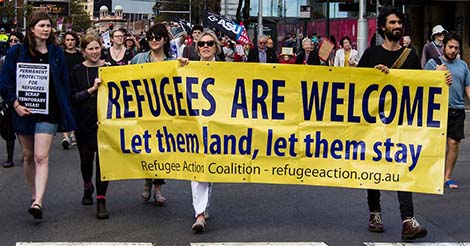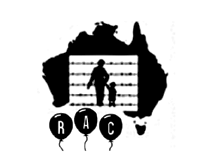 There are a number of organisations in Australia that are working on the refugee issue. What differentiates us from the others?
There are a number of organisations in Australia that are working on the refugee issue. What differentiates us from the others?
RAC’s approach to political change is primarily built around the mobilisation of large groups of people in rallies and other forms of public actions, with a view to force the kind of change we want to see. Though we do plenty of other smaller-scale things, like conducting stalls, talks, film screenings and so on, most of our work is geared towards large public demonstrations.
Mass-mobilisation is at the heart of RAC, because we recognise that the refugee issue is not going to resolve itself. The only thing that would induce whatever party is in government at the time to become humanitarian on refugees is an enormous movement of people expressing their discontent and demanding an alternative. Mass demonstrations are both a highly accessible form of political participation — all you have to do is turn up — and one which publicly displays the strength and unity of the determination around an issue. Compared to other forms of engagement like signing a petition online, or writing to a politician, demonstrations are public and high-energy: in occupying public space, protesters assert their demands for all to see, and show that they are serious enough about achieving them to turn out en masse on the street.
There are essentially two types of activity within the refugee sector, although some organisations straddle both.
One type of activity focuses on the provision of welfare and social support in a broadly charitable framework. The provision of these services is essential in the current situation where the government denies refugees access to work, welfare and medical care. Often, these groups avoid being openly “political”; they frame the most severe problems refugees face as primarily humanitarian or due to a lack of empathy; the resulting call to action takes the form of requests for volunteers, and for donations of food and money.
The second activity is focused on achieving long-term political change by growing an activist movement. This means mobilising people through mass rallies and protests, online actions and public forums. The particularly awful policies put in place in this country in the past few decades were put in place as cold, calculated judgements, for the political gain of the politicians who implemented them. Political problems require political solutions, and these politicians are not going to change unless we make them.
A group like RAC, disconnected from concerns about income flows, has much greater room to breathe and act independently. As an organisation, we’re not dependent on money from the government or from private donors in order to operate. A significant reason why many existing refugee welfare organisations are prevented from acting politically – in the way we feel is necessary – is because they fear taking a stronger stance may alienate donors or result in government funding being withdrawn. In order to increase income from donors, organisations find themselves adopting a number of marketing strategies that further increase the divide between passive spectators and active participants – between a large group of donors, and a small group of staff members.
Mass-mobilisations, on the other hand, have the effect of turning passive spectators into active participants. Many RAC members come into refugee activism after attending a rally we’ve organised, either out of their own personal curiosity or because a friend or family member brought them along. They might have read the news, and discussed it with friends and family; they may have existing pro-refugee beliefs, yet never gotten involved until the rally, but after attending they feel like they have some capacity to change things, so they get more involved. This is a process we’d like to see repeated, because we think it’s the most effective way of bringing about popular change.
This is also explains the structure of RAC somewhat: RAC does not have official positions or paid staff members; neither does it have membership dues and a closed structure. Anyone can participate in RAC’s meetings, so long as they are committed to our central aims of ending mandatory detention, temporary protection visas, forced deportations, and so on. RAC’s meetings are democratic, and open to anyone and everyone, regardless of race, gender, religion, class, financial status, and so on. Our members are a diverse bunch, incorporating young and old, the employed and unemployed, students and full-time workers, teachers, long-time activists, people of diverse cultural backgrounds and so on.
We know that in order for a political strategy to be effective, it must be empowering – RAC activists do not merely take orders, but work to formulate our own plans collectively, with all members contributing. It also requires reaching out to wider sectors of the Australian population in order to turn what is often the primary concern of a small politically active fringe into a genuine mass-movement, popular among all sorts of people in this country.
In line with this, RAC is a collaborative organisation that works side-by-side with a number of groups to achieve common goals. For instance, we often have speakers from other organisations come speak at our forums: in the past year, we’ve had everyone from a representative of the Tamil refugee council, to professionals from Amnesty International. We also work with other groups interested in mass-mobilisation; one of the main things we’ve been focusing on recently is joint work with Justice for Refugees, a network of Temporary Protection Visa holders organising and fighting for permanent protection rights.
If you’re interested in learning more about RAC’s approach to activism, get in touch or come to one of our regular meetings – 6PM every Monday night at the Teacher’s Federation building in Sydney.
*Due to COVID-19, the regular Monday meetings have been replaced with fortnightly Zoom meetings. We’re still as open as ever, so get in touch and we can give you the details.

